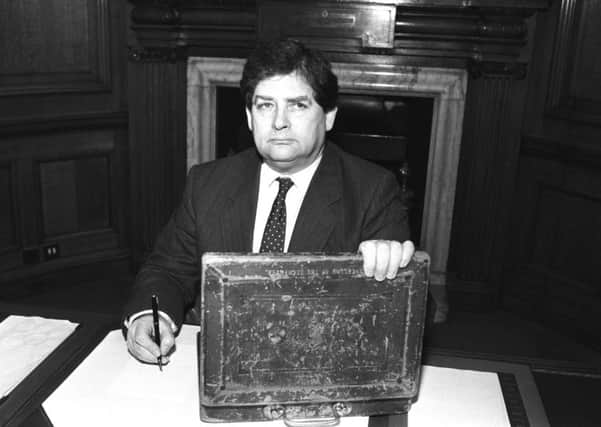On this day: Nigel Lawson resigns as Chancellor


National Days of Iran and Austria.
1814: Governor-general of India declared war on Gurkhas of Nepal.
1861: First public demonstration of the telephone made to the Physical Society, Frankfurt.
Advertisement
Hide AdAdvertisement
Hide Ad1863: Football Association was formed at a meeting in London.
1896: Italian protectorate of Ethiopia was withdrawn by Treaty of Addis Ababa.
1907: The Territorial Army was established by Richard Haldane, secretary of state for War.
1911: Chinese Republic was proclaimed.
1912: Woolwich Tunnel under the River Thames was opened.
1917: Brazil declared war against Germany.
1950: First sound and television broadcast from the House of Commons as King George VI reopened chamber after repair of 1941 bombing damage.
1955: Republic of South Vietnam was proclaimed under Ngo Dinh Diem.
1962: Soviet premier Nikita Khrushchev offered to withdraw missiles from Cuba if United States removed bases in Turkey, but was rebuffed.
1976: United Nations General Assembly, demonstrating disapproval of apartheid, voted 134-0 to call on member governments to prohibit all contacts with the Transkei – first of South African black homelands to secure independence.
1988: In Strasbourg, Jacques Delors accused Margaret Thatcher of wrecking progress towards an open European market in 1992.
Advertisement
Hide AdAdvertisement
Hide Ad1989: Nigel Lawson resigned as chancellor of the Exchequer, plunging the government into the greatest turmoil of the Margaret Thatcher years. She named John Major, her recently-appointed foreign secretary, to succeed Mr Lawson.
1989: An RAF corporal and his baby daughter were shot dead by the IRA at a petrol station near RAF Wildenrath in West Germany.
1991: Hundreds of foreigners left Kinshasa as military mutiny spread in Zaire.
1994: An environmental report called for a doubling of petrol prices in Britain in ten years and said the government had to move faster on restraining the use of public cars.
1999: House of Lords voted to end the right of hereditary peers to vote in the upper chamber of Parliament.
2000: Laurent Gbagbo took over as president of Côte d’Ivoire following a popular uprising against president Robert Guéï.
2001: The United States passed the Patriot Act into law.
2002: More than 100 hostages died when Russian special forces using knock-out gas attacked Chechen guerrillas holding more than 800 people hostage in a Moscow theatre.
2010: A survey revealed that more people (91 per cent) owned a mobile phone compared to a watch (86 per cent).
ANNIVERSARIES
Advertisement
Hide AdAdvertisement
Hide AdBirths: 1729 Lord Cockburn, Edinburgh-born judge; 1803 Joseph Hansom, inventor of the hansom cab; 1872 CP Scott, journalist and politician; 1879 Leon Trotsky, one of founders of Soviet state; 1902 Jack Sharkey, world heavyweight boxing champion; 1905 Viscount Muirshiel, formerly Jack Maclay, Scottish Secretary; 1911 Sorley MacLean, poet and teacher; 1916 Francois Mitterand, president of France 1981-1995; 1924 John Campbell Arbuthnott CBE, 16th Viscount of Arbuthnott, Lord Lieutenant of Grampian 1977-99; 1942 Bob Hoskins, actor.
Deaths: AD899 Alfred the Great; 1764 William Hogarth, painter and engraver; 1845 Carolina Oliphant (Lady Nairne), poet and songwriter (Gask, Perthshire); 1932: Molly Brown (“The Unsinkable Molly Brown”), socialist, activist and Titanic survivor); 1966 Alma Cogan, singer.